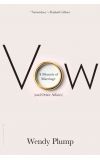
10 Mar 2013 04:02:44
Plump front-loads the big reveal, the better to garner reader sympathy, which tends to drop a notch every time the author confesses to another of her own four affairs – the first when her marriage was barely a year old. Granted, this mother-of-two scores points for honesty. After all, the whole reason for the memoir is to try to explain what drives so many people to seek, perhaps repeatedly, the adrenal rush of a new sexual partner in defiance of a lifelong commitment. The puzzle merits solving. Had Plump shed more light on the matter, we might overcome the surprisingly Old-Testament judgment that often arises even in modern readers who fancy themselves open-minded when confronted with stories of betrayal and deceit. Besides, for the book buyer, Plump suffers from a far greater failing than marital turpitude: she can't write.
It isn't just the thud of the insultingly self-evident: "In the end, I think you either cheat or you don't," or the over-obvious emotional arithmetic: an unmarried lover shoulders the guilt more easily "because he is betraying a stranger rather than the person to whom he gave a lifelong vow". It isn't just the bland faux-profundities: "We all break in the same human way" – or the self-help clichés: "I was good at compartmentalisation." It's the metaphors.
Mixed, inapt, overextended, or plain ghastly, these clunkers are hardly the stuff of occasional lapse, because they are everywhere. "I was born on the windy side of the personality island." Or, "I want sex to pierce reality and come blazing out the other side." Or, "I could no longer manage the tilt of our marriage. It drifted out of my control, its tides caught up and dictated by Bill's grief." A tide doesn't tilt. Picky? It gets worse. In a new infatuation, a "hot mix of smashing atoms" generates "an unpredictable plasma". When the author laid eyes on a lover, "the immediate sensation was of some soft, squirrely creature rolling around in my rib cage". Plump made use of the "Tao" of infidelity by "squeezing that logic like a cheese". It's a contest, but in the end this one takes the prize: a friend took a position in relation to Bill's treachery, "A position that I would like to pass on now that the egg white has passed through the eggshell and I can see the wisdom of it." Hey, Heston Blumenthal, I want to see it in real time.
The author is no better at coining snappy analogies. For the adulterer, thou-shalt-not condemnations are "about as useful as throwing spring onions at a charging wolf." Indeed, so ineffectual must hurling spring onions be in this circumstance that it's doubtful anyone has ever tried it.
Throughout the text as well, Plump relentlessly employs a soiling second person, either to wrench the reader into an enforced intimacy or to impart a grander universality to her experience, for example: "You become very careful about your adulterous pleasures." I become careful? Excuse me, I thought this was your story, lady. Given the tawdriness of the material, I kept feeling, "Get this stuff off me!" With all the "you do this" and "you think that", reading this memoir is like being confided to by a woman who spits when she talks.
The forest of metaphors and fake universality both serve to distance the writer, and for all her naming of emotions – desire, fury, grief – very little raw feeling surfaces. By contrast, a genuine catty sourness does emerge in a single paragraph. The husband's mistress, Susan, has sent his wronged wife an email that still sticks in the author's craw. However improbably, Plump continues to live with her husband after the discovery of his second family, at first blindly assuming that he's called off the affair. The email not only apprises her otherwise, but graciously promises to ensure that Bill will continue to visit their two sons. "Here, I have to pause to thank Susan for allowing my husband to spend time with us. I can only assume she would do the same for any additional families Bill happens to have spawned. But anyway." The rare, unmediated bitterness comes as a relief.
The point is: the writing matters. This isn't a typically low-rent guilty pleasure. There's no pleasure. The story remains inert. The harder the author tries to elevate her hard-won lessons into wise generalities, the less her story comes alive and the less she actually has to say. Thus the text is not only wince-inducing but, despite its titillating premise, dull. Given the wretched quality of the prose, it's tempting to blame the editor – unless the original manuscript was even worse and this is the cleaned-up version (which beggars belief). And yet the subject of infidelity is wholly worthy of scrutiny, encompassing as it does the most searing of emotions: the horror of lying, rage at being lied to; disappointment in a spouse, or even more devastating, disappointment in oneself. But if that's the palate that appeals, reread Anna Karenina.

